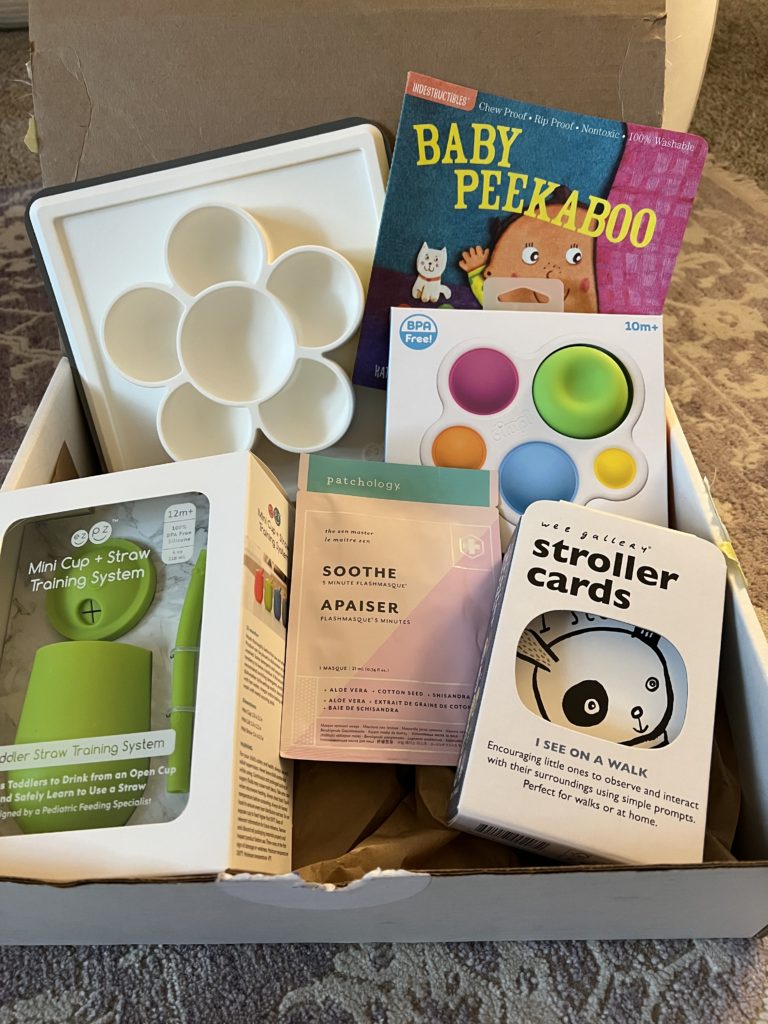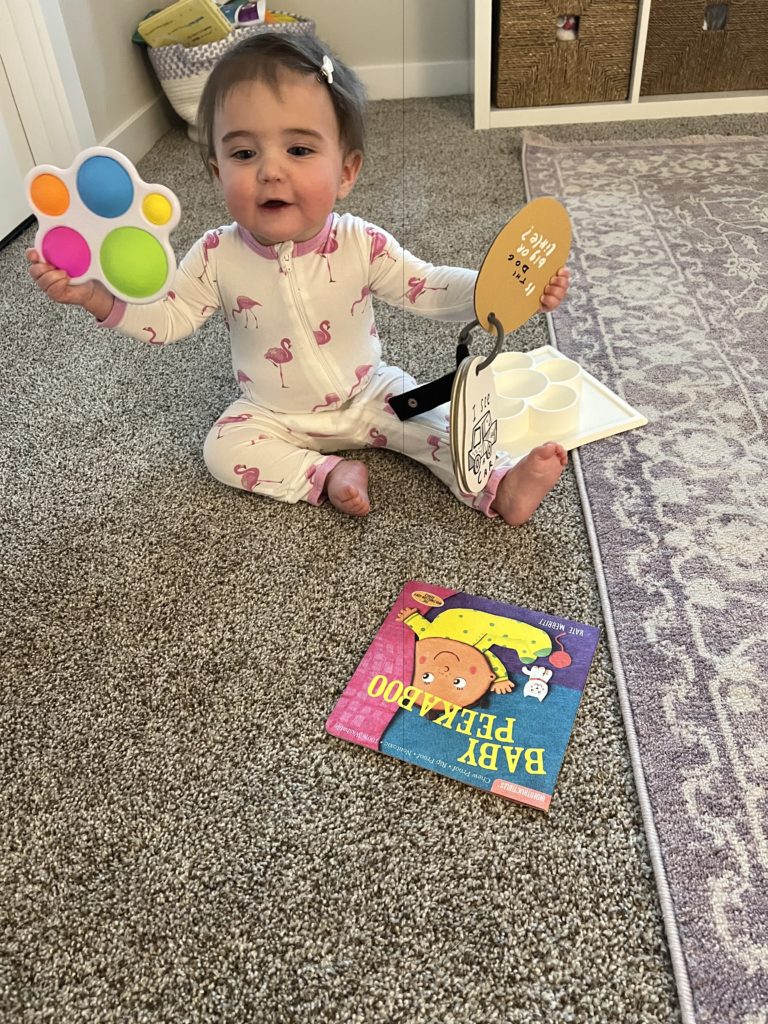
Baby Doc Box is a pediatrician curated subscription box for baby and parent’s first year. Every 2 months you receive a box that provides 5-8 well researched, practical, safe, and developmentally on-point toys and tips for you baby’s age. I explain more in depth about baby doc box as well as review 0-2 month box in this post. I reviewed box months 2-4, 4-6, and here is what’s in the 6-8 month box.
Kins has been a little sick this week and I have been going back to products and information I received in past boxes like the NoseFrida, thermometer, BreatheFrida The Boogerwipes, and Fridababy Vapor Drops. Products I might not readily have on hand if not for these boxes!
The 8-10 month mark is one of my favorites ages and this box was just as fun!
Here is what it included:

The ezpz Mini Cup and Straw System: She LOVES her water! Can’t wait to start this training cup
Wee Gallery Stroller Cards: These are so awesome to attach on the stroller or car seat
Fat Brain Toys Dimpl: She’s always stealing Quinn’s fidget toys and now she has her own!
Indestructibles Baby Peek-A-Boo book: Her favorite books! She loves to chew on them (see bottom picture)
Patchology Face Mask: mama’s gift!
An educational guide that explains it all: I keep all of these educational guides to refer back to!


Kin’s romper
Pediatrician Q&A
with ALISON SCOTT, MD, FAAP
Q: What is the best way you have found to sleep train 11 month old who doesn’t want to fall asleep alone?
A: I start talking about sleep early with parents as it is much easier to develop healthy sleep habits around 4 months. As babies get older it can be trickier but not impossible!
The same sleep tenets for younger infants remain true at this age: Consistency, Planning, Buy-In. Make sure their room is dark and quiet for bedtime. Focus on night time sleep first then naps.
Consistency: you need to be consistent with bedtime, routine and method for healthy sleep habit formation (check out https://www.babydocbox.com/blogs/news for more about healthy sleep habit formation)
Planning: Come up with a strategy that feels right for you and your family and stick with it. I usually recommend reassessment after 10 days but with older babies I would go 2-3 weeks before considering a change in approach. ( I do not believe there is only one way to do this and one way may work for one family but not for another. I will give two examples but there are lots out there!)
Buy-In: If there are multiple parents or caregivers involved in your baby’s sleep they all need to be on board with the plan so as not to sabotage any progress.
A couple examples for this situation you can try:
- Parent sleeps in the room with the baby as they fall asleep on their own in their crib (after you have completed your pre-bedtime ritual). Each night or every 2-3 nights the parent moves slightly farther away from the baby. I suggest leaving the door open while doing this and eventually the parent moves to the outside of the room.
- Extinction = cry it out. You can choose a set time to come back in and check on your baby with minimal intervention and extend the time you are gone by 5′ each time. This may not suit all families but is often faster than versions of #1. It can be more stressful with older babies as they can often stand up and be even more persistent than younger babies but it will work eventually if done consistently. Make sure if your baby can pull to stand the crib mattress is lowered as far as it can go.
Q: Teething help! Does it last forever?
A: It does not last forever! Promise! Most initial teething occurs between the ages of 4-15 months.
For some babies it can cause irritability, slight decrease in eating and drinking, swollen gums, rubbing ears and drooling. Teething is never an explanation for a significant fever, significant diarrhea, severe diaper rash or all over body rash. There are lots of teething tools on the market. The 2-4 month baby doc box features one which I love, check it out @babyteethingtubes. I do not recommend teething gels. If your baby is suffering significant discomfort from teething it is OK to give them an age/weight appropriate dose of Tylenol. I usually suggest no more than 3-4 days in a row of medication for teething.
Q: Do you recommend starting with purees or BLW when starting solids? Any dos/don’ts?
A: Starting solids is a developmental process that occurs over time, usually it takes up to 6 months to transition from a full liquid to mostly solid diet.
I do not recommend one method over the other. I think there is value in purees and the BLW method and would encourage parents to try integrating both. For parents who are nervous about starting solids it may be easier to trial purees first. There are tons of great BLW sites. Some of my favorites are on IG: babyledweanteam, solidstarts, msdawnslp, theclinicaldietician. They include specific BLW tips and general feeding tips for typical and picky eaters.
Do have realistic expectations about your baby’s intake which may be minimal at first and that’s OK.
Do offer a variety of foods and try to eat at the table with your baby as much as you can for modelling.
Do provide a stress and pressure free environment. Avoid temptation to urge for “one last bite”.
Do pay attention to your baby’s cues for being finished with eating.
Do take an infant CPR class before starting solids.
Do familiarize yourself with the difference between gagging and choking.
Do incorpaorate common allergens as some of babies first foods.
Don’t feed your baby choking hazards: raw or hard fruits and vegetables, popcorn, whole berries/tomatoes, nutes/seeds, chips/hard crackers, sausage.
Don’t pressure your baby to eat more when they are finished.
Don’t stress if it seems like they are not eating enough solid food.
Q: When can you introduce a lovey or blanket in the crib?
A: The AAP recommends a lovey not be placed in a crib with a baby until age 1 year old.
You can introduce a lovey to your baby for soothing and comfort but keep it out of the crib or sleep environment until 12 months or older due to the risk of SIDS.
Q: How many ounces of milk does a 7-8 month old need per 24 hours?
A: I don’t usually answer this question directly (unless it is out of medical necessity) , and I get asked it a lot. At any age prescribing an exact amount of milk intake needed per day causes added and unnecessary stress for parents. In general most babies will get what they need and thrive. Your regularly scheduled pediatrician visits check growth parameters and help guide any need for changes in intake. The number of calorie/ounces needed for growth is calculated using a baby’s weight so will be different for each baby. Around 6 months the growth curve for infants flattens out significantly. The weight gain slows down normally and they may even take in less or the same amount of milk or formula as they were at 4 months. That’s another reason starting solids around that age makes sense. If you are a number person I’ll say in general most babies that age will be drinking at least 20 ounces a day. Sometimes more, sometimes less and may depend on their solid food intake as well. Bottom line if they are following their growth curve they are doing great!
Q: When should baby be having solids 3 x day?
A: By 12-15 months most babies are eating 3 solid meals a day. If it’s happening earlier, great!
If you have more questions for the doc drop them in the comments section. You can also follow babydocbox on IG here.

xx, A